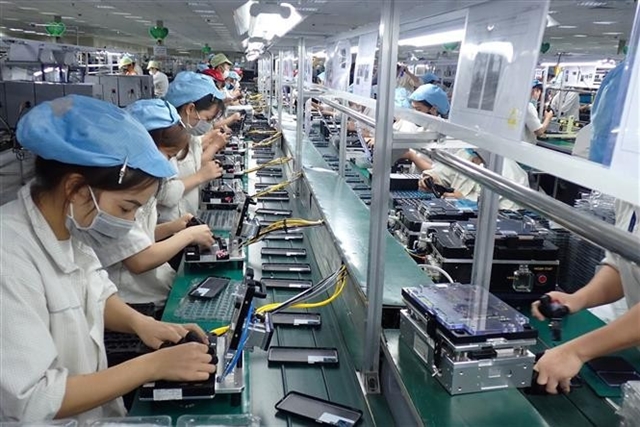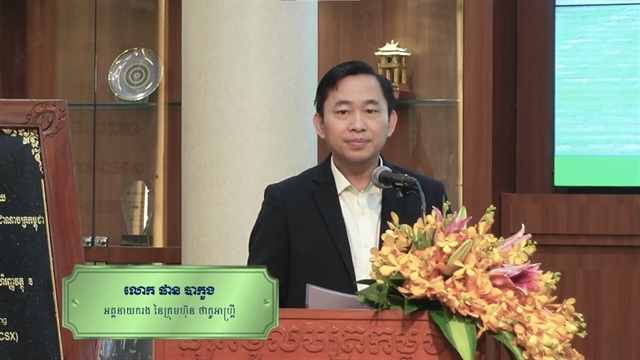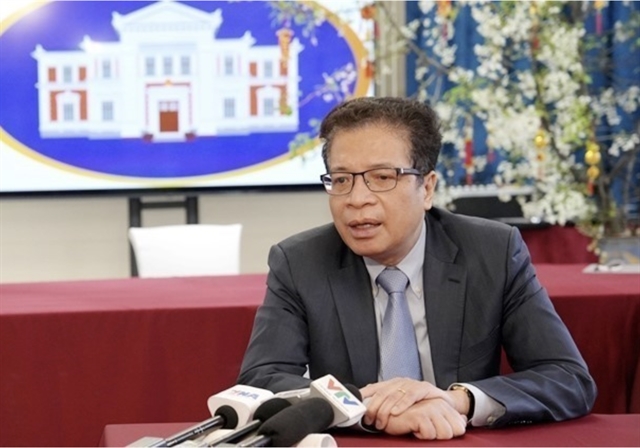

Việt Nam is integrating deeper in the world economy, proved by the freshly-signed agreements between Việt Nam and EU on trade and investment, and previously CPTPP. Accounting and auditing is one of the areas that need better reform to meet international standards.
Việt Nam is integrating deeper in the world economy, proved by the freshly-signed agreements between Việt Nam and EU on trade and investment, and previously CPTPP. Accounting and auditing is one of the areas that need better reform to meet international standards.

|
Mr. Robert Stenhouse, ACCA President
What is your assessment on Việt Nam’s recent improvements in this area?
Mr. Robert Stenhouse, ACCA President:
These are a welcome development in Việt Nam. ACCA believes in global standards and accounting regulations, so it is pleased to see agreements such as these being reached.
Global standards are important as they provide transparency and accountability on the global stage – this is a benefit for investors and governments. They provide clarity, parity of information and harmonisation which is essential for economies to succeed.

|
Mr. Pulkit Abrol, Director, ASEAN ANZ, ACCA
Mr. Pulkit Abrol, Director, ASEAN ANZ, ACCA:
In recent years, accounting, the audit profession in Việt Nam has developed and played an important role in the current economic landscape. Not only by supporting enterprises in establishing financial and economic information which is compliant with law, accounting and auditing are essential tools to review the transparency and openness of financial information; then, leading to a healthy national financial system.
The Government’s initiative to revising many legal regulations in order to suit new developmental stages of the economy is a welcome sign. Very recently, in 2018, the Government focused on researching and applying International Financial Reporting Standards (IFRS) and International Public Sector Accounting Standards (IPSAS), and we are positive that then there would be continued initiatives to further strengthen the accounting and audit profession through announcements related to the application schedule in 2019-20.
What changes and impacts will the Fourth Industrial Revolution (Industry 4.0) with the development of AI, IoT, Big Data have on the accounting and auditing processes and methods now and in the future?
Mr. Robert Stenhouse, ACCA President:
There are many changes happening in business, finance and accountancy – the Fourth Industrial Revolution (Industry 4.0) is having a massive impact and will continue to do so.
ACCA has been examining many of these changes throughout professional insights work and there are two reports that are very relevant: Audit and technology, and Closing the expectation gap in audit.
The first report "Audit and Technology" looks at the audit profession and its approach to AI. Our report has found that audit is still at the very early stages of introducing artificial intelligence, but should guard against full implementation.
The report reveals how technology is also a catalyst that will help shift the focus of the audit process from a retrospective view to one which is prospective. It also assesses the technologies having most impact on the audit profession as we know it today.
Drawing on existing research and exploring the views of leading practitioners, it provides an understanding of how the changing business environment is shaping technological change in auditing – summarising how different technologies could be expected to impact its future and what this means for auditors as people.
ACCA’s report "Closing the Expectation Gap in Audit" found that 55 per cent of the general public across 11 countries believe that, if auditors followed the requirements of existing auditing standards, they could prevent corporate failure.
Furthermore, 70 per cent believe that audit should evolve to prevent corporate failure. Although some may reasonably argue that such demands are unrealistic, technology may help to satisfy the public demand, at least partly, in future.
Technology offers the ability both to improve the quality of audit and to add value to it: audit is moving from being a reactive, backward-looking exercise to a proactive, predictive, forward-looking one, working in real time. As such, it provides an opportunity to help clients by providing timely insights. Even in its traditional context, technology now offers an opportunity to produce higher-quality audits that better serve for their existing purpose.
It’s vital that economies also prepare their workforces through the change that is on the horizon through investing in accounting and audit talent and provide work skills in a multi – generational workforce to meet demands of industry.
It’s not easy for Vietnamese small and medium enterprises (SMEs) to comply with international accounting and auditing standards, especially EU norms? Could you provide some recommendations on this issue and introduce some support and cooperation programmes that ACCA is working with the Government or business organisations?
Mr. Robert Stenhouse, ACCA President:
We understand that SMEs find such issues a challenge. SMEs by their very size do not often have the support teams in place in-house to manage such standards. However, this is where they need to turn to an accountant for their services and guidance. They can steer a SME through the necessary regulations and ensure they are compliant. This is why accountants are so often seen as trusted advisors for SMEs, relied upon to offer relevance services that help SMEs grow.
We have produced a great report called “Scale-up success: what do SMEs need to supercharge their growth? “which talks about how SMEs can grow for the future.
One of the recommendations is for them to grow their networks and external contacts, so that they can learn from others and also make new connections that help them grow.
If they are finding rules and regulations to be a challenge, then a professionally qualified accountant – an ACCA member – should be first on their contact list.
Mr. Pulkit Abrol, Director, ASEAN ANZ, ACCA:
In order to support Việt Nam in setting up IFRS application schedule and actuality to suit business and Việt Nam economic conditions in reality as well as enhancing external audit quality, at the end of 2018, ACCA and Việt Nam Association of Certified Public Accountants (VACPA) introduced Certificate in International Financial Reporting (CertIFR) and the booklet “Guidelines for application of international auditing standards in small and medium practice (SMP)” of the International Federation of Accountants (IFAC).
CertIFR helps accountants, auditors, financial professionals, investors and government authorities to catch up with global IFRS application trend, breakdown main requirements of each standard at preparer, auditor and financial statement user level as well as how to apply in reality. This booklet provides concepts, core principles of international auditing standards and specific situations on how to carry risk-based audit.
ACCA also has the plan to share its global report of international experience on IPSAS application in 2019 with the State Audit and the Ministry of Finance. This is one of many endeavours of ACCA in Việt Nam in coordination with its core international such as IFAC, World Bank and its important partners in Việt Nam such as the State Audit, the Ministry of Finance, the State Security Commission of Việt Nam, professional associations, audit firms, enterprises and universities in order to contribute to the professions’ development.
We are committed to support the government’s initiatives in this area and would continue to do so in the future.
In your opinion, what priorities should the Vietnamese Government focus on when undertaking reform in the financial sector in the near future? What are challenges and how to overcome?
Mr. Robert Stenhouse, ACCA President:
To keep my answer succinct, we recommend that the government continues to build connections with others.
It has been doing this very well, so for ACCA this is not about changing tactics, but developing and building upon them.
Connections in the accountancy profession and business world are important. Indeed, over the next three months, we are focusing on this theme, showing how the profession is a super-connector for business and the public sector.
Accountancy is the global language of business, and we connect business with society through the work that we do. It is important that this remains an opportunity.
The challenges ahead are many, but they are also opportunities.
Technology remains a challenge and an opportunity – keeping up with the speed of change is a huge challenge, but the opportunities for us all comes in using technology for our benefit.
The other challenges ahead are to do with skills and talent – do countries have the right skills and talent in place to build economies. I note that Việt Nam has a strong vocational education and training policy that serves the economy well.
What is ACCA’s new strategy in Việt Nam?
Mr. Pulkit Abrol, Director, ASEAN ANZ, ACCA:
We want to build a strong and trusted finance accountancy profession in Việt Nam.
We follow ACCA’s global strategy here in Việt Nam - to be number one in developing the accountancy profession the world needs, and which Việt Nam needs.
This means working in partnership with other organisations – from learning providers to employers to the government. ACCA is proud to be a long term and efficient partner to contribute to enhance the capability of local government and professional bodies in order to meet the needs of quality enhancement of policy improvement, governance and oversight of the nation’s activities.
Many government officers follow ACCA programme, become ACCA members, actively contribute with their international knowledge and practice into working place, many of them hold important positions in the State Audit and Ministry of Finance.
ACCA shared its royalty on its training programmes, mock exams and documents to support the State Audit in setting up their training programs for State Auditor Certificate.
From an ASEAN perspective, ACCA has a long standing presence in ASEAN starting with completing 15 years in Việt Nam recently in 2017. We very much see ASEAN and in turn Việt Nam as a major driver of pan-Asian and global growth over the next decade with increasing investment in infrastructure, growing market access, young labour force which will require upskilling and growing adoption of digital transformation.
Fundamental to this potential is Việt Nam’s growing trading links with the world – UK, EU, Commonwealth and other forums through several broad ranging trade agreements.
Through our work connecting with businesses large and small, governments, educational establishments and opinion formers, ACCA advocates strongly the adoption and harmonisation of international standards which will serve to build trust and transparency in trade across the region and beyond.
As a professional association in accounting, auditing, finance, governance that are the fastest and strongest developed association in the last 5 years with its network with over 219,000 members and 527,000 globally and many of them from public sector, ACCA frequently researches, forecasts and actively participates in the newest development trend of the professions.




